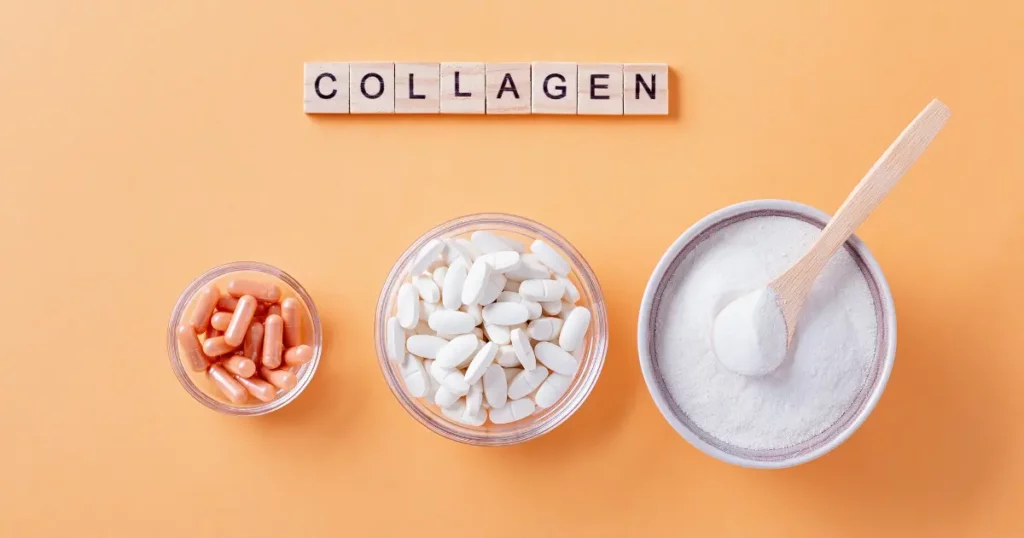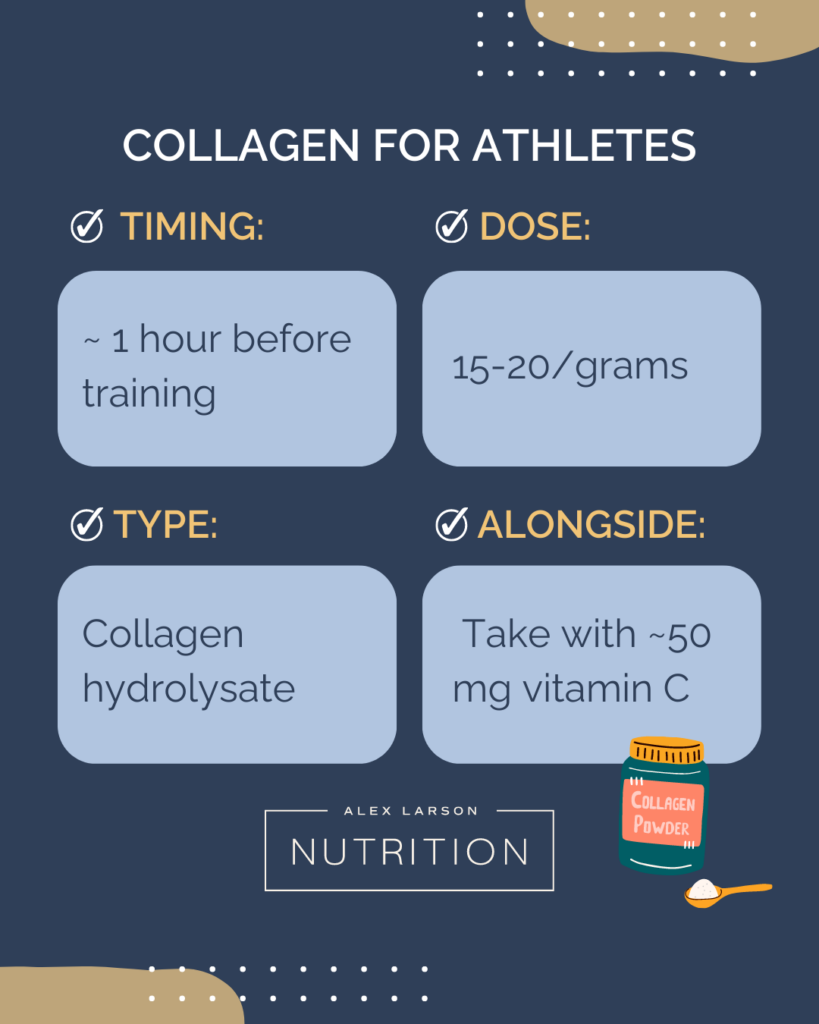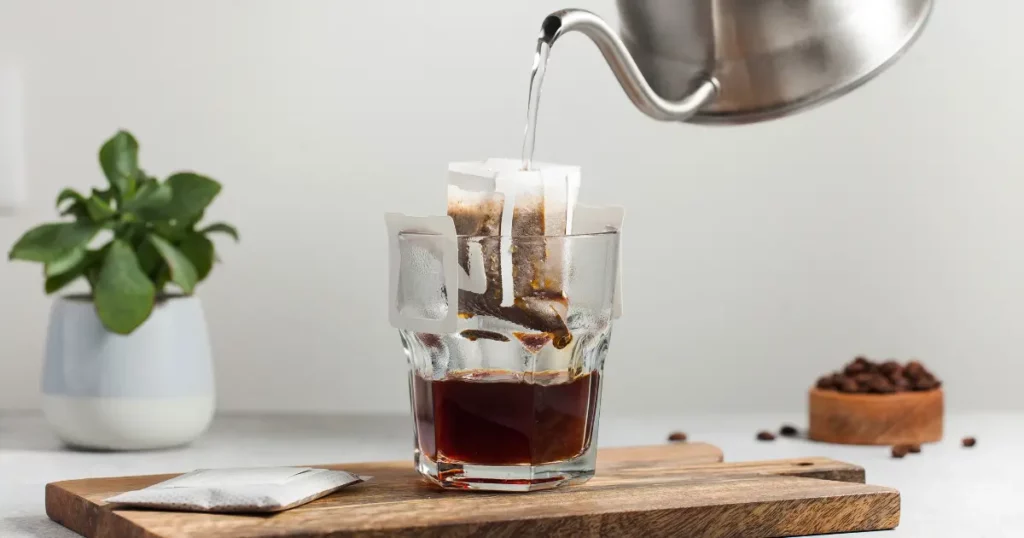RUNNING →
Level Up Your Nutrition Game With Our Freebies
Alex
I provide nutrition coaching for endurance athletes to improve performance and body composition through a simple and flexible eating style.
Hi, I'm
ATHLETE EATING GUIDE →
PROTEIN →
TRIATHLON →
RECIPES →
PERFORMANCE NUTRITION →
SUPPLEMENTS →
HOLIDAY & TRAVEL →
PLANT-BASED →
FEMALE ATHLETE NUTRITION
Explore the Blog
LEARN MORE →
ATHLETE GROCERY SHOPPING GUIDE →
RACE DAY: TRIATHLON NUTRITION PLANNER →
READY TO FUEL?
incredible value!
The fueling guide bundle serves as your one-stop-shop for strategies to fueling before, during and after your workouts.
ENDURANCE EATS
BINGE-WATCH READY!
YOUTUBE SERIES
Are you curious about collagen for athletes? Collagen supplements are another trendy supplement that has been all over the athletic community for years. Whether it is getting blended into coffee or thrown into bars, it is likely you’ve been introduced to collagen in one way or another.
When it comes to endurance athletes, collagen gets particular attention for it’s potential to support joint health and enhance recovery time. In today’s article, I will be going into more detail about what collagen supplements are and the best way to take them. Keep reading to learn more!

What are Collagen Supplements?
Collagen is the most abundant protein inside your body. It makes up a substantial portion of your skin, tendons, ligaments, bones, and muscles. Additionally, it provides elasticity, structural support, and strength to a variety of tissues and organs.
Your body can naturally produce collagen from amino acids glycine, proline, and hydroxyproline. However, as you age, your collagen production starts to decrease, as much as 1-1.5% every year.
This decline in internal collagen production leads athletes to seek out collagen from external sources, i.e. foods and supplements.
Food sources that are high in collagen include:
- Bone broth
- Lean meats
- Poultry
- Eggs
- Fish
It is encouraged for athletes to include food sources of collagen in your diet when you can. But what about supplements?
Collagen supplements are specially formulated products that contain various forms of collagen. The most common source is bovine collagen, which is a protein found in the tissues and ligaments of cattle. Marine collagen supplements, which are derived from the skin of fish, are also rising in popularity.
The supplements typically come in either a powder or capsule form.
What is the Difference Between Collagen and Protein Powder?
Collagen supplements and protein powder aren’t the same things, even though you may see them used interchangeably. This is actually not the case!
Collagen is not a complete protein, meaning it doesn’t contain all of your essential amino acids like a whey protein powder would. While collagen for athletes can be beneficial for other reasons listed below, it shouldn’t be used in replace of a protein powder.
If you are looking for a quality protein powder supplement, Thorne is the way to go! Use this link to get 15% off. I personally love the chocolate whey protein isolate.

Benefits of Collagen for Athletes
Taking a collagen supplement won’t magically enhance your performance or cut minutes off your race time. You want to make sure you are focusing on the fundamentals of performance nutrition first before diving into an advanced supplement regimen.
Need extra guidance on what this looks like? Make sure to check out our performance nutrition services for endurance athletes!
That being said, collagen supplements do have reported benefits for athletes, primarily centered around joint health and injury recovery.
Joint Health
Endurance athletes are putting continuous strain on joints due to intense training and repetitive motions. Collagen is a key structural component of tendons, ligaments, and cartilage and helps to maintain their integrity and flexibility.
Incorporating collagen-rich foods and supplements into your day can help to support joint health, minimize joint pain, and improve your overall mobility.
Injury Recovery
Injuries can happen to all athletes at some point your career. Collagen is involved in the repair and regeneration of body tissues, which can speed up your healing process.
Recent studies have found that 15 grams/per day of collagen improved joint pain and flexibility, as well as muscle recovery.
If you find yourself sitting on the sidelines with an injury, you may want to consider a collagen supplement during your recovery period.
Even further, there is also some merit to collagen being able to prevent injuries from occurring in the first place. So if you have a season of high-training demands, a supplement may be beneficial for prevention purposes.
Training Recovery
Being able to recover quickly and efficiently after training is essential for endurance athletes. Collagen has been noted for it’s ability to speed up recovery time by aiding in protein synthesis. Protein synthesis repairs damaged muscle fibers after intense exercise, which can accelerate the recovery process.
For athletes who are prone to muscle soreness after training, current science suggests that a collagen supplement may be able to help. That being said, make sure you are still prioritizing post-workout nutrition, as this is the gold standard for a speedy recovery.

What is the Best Collagen for Athletes?
There are actually over 20 different types of collagen, but types I, II, III, IV, and V are the most abundant in your body.
When it comes to supplements, there are three forms of collagen that are commonly used. Each form contains different combinations of the types of collagen that I mentioned above.
Here is a quick breakdown:
- Hydrolyzed collagen: Collagen hydrolysate is the most popular form in supplements. It is derived from bovine, marine, poultry, or other animal sources. Additionally, it is broken down into smaller particles that are easier to absorb, called collagen peptides.
- If you see “collagen hydrolysate” or “collagen peptides” on supplement labels, they are referring to this form.
- Undenatured collagen: This type of collagen is derived from chicken cartilage and consists mainly of type II collagen. It differs from hydrolyzed collagen in that it hasn’t been broken down with heat, acids, or enzymes.
- Gelatin: Gelatin is a type of cooked collagen derived from animal sources. Gelatin is typically added to food products.
So, which one is the best for you? Research is still emerging on the use of undenatured collagen over hydrolyzed collagen for specific conditions, including joint health. When introduced in small doses, undenatured collagen may impact your immune system, and promote the reproduction of joint cartilage. This in turn could reduce joint pain and lower inflammation, especially in patients with arithtis or other joint conditions.
For now, unless otherwise specified by your care team, sticking with hydrolyzed collagen supplements as an endurance athlete appears to be the best way to go to ensure maximum benefits.
Quality Supplement Brands
It is important to choose supplements that are third-party tested, especially as an athlete. Even further, you want to look for NSF Certified for Sport or Informed Choice for Sport when choosing a product. This ensures the product doesn’t contain any ingredients that are banned for athletes.
Again, my fav brand Thorne Research has a few different collagen products, both flavored and unflavored. Shop through this link to get 15% off, discount applies at checkout!
Collagen For Athletes: Dosage + Timing Recommendations
Studies confirm that a typical dose of collagen is between 5-20 grams. While this is a large range, a serving of 15-20 grams is recommended as the most effective. Since you will likely be taking collagen in a powder or capsule form, it is generally safe to follow the serving recommendations on the product itself.
As always, if you have any questions or concerns about supplement dosages, speak with your healthcare team for more specific recommendations.
Timing Recommendations
In regards to timing your supplement, absorption speeds up and peaks around an hour after you take it. Getting blood flowing to your joints can help the collagen disperse where it needs to go, which is why taking it before a training session is recommended.
Preliminary research highlights that taking 15-20 grams about an hour before your training can have therapeutic benefits for athletes. This is a great place to start out and experiment with, and then you can adjust from there.
Collagen + Vitamin C
Did you know that collagen and vitamin C are a powerhouse duo? Vitamin C plays a critical role in the production, absorption, and formation of collagen inside your body. That being said, eating/drinking high sources of vitamin C (~50 mg) alongside your collagen can help enhance absorption and lead to greater benefits.
Try mixing a scoop of collagen powder in with 12 oz of orange juice prior to your training session. Other vitamin-C rich foods include:
- Other citrus fruits
- Spinach
- Cherries
- Peppers
- Tomatoes
- Strawberries

Collagen In Your Coffee?
Collagen coffee is a recent trend that involves dissolving a scoop of collagen powder into your morning cup of joe. Since collagen powder is relatively tasteless, it doesn’t alter the taste of your coffee, while still providing the benefits.
There has been one study noting that caffeine may inhibit collagen biosynthesis, or the production of collagen in your body. For now, I wouldn’t be too worried since this is one small study. If you enjoy taking collagen with your coffee in the AM before a morning workout, that is perfectly fine.

Is Collagen Suitable for Plant-based Athletes?
Since collagen is derived from either bovine or marine sources, collagen supplements wouldn’t be suitable for plant-based athletes who omit meat and fish from their diet. If you are a pescatarian who eats fish, then a marine collagen supplement would be an appropriate option for you.
You may be wondering, what about the plant-based collagen supplements you see in the stores and online?
There are plant-based products that claim to be “collagen-promoting” but the efficacy of these supplements is still unknown. More research needs to be done before I can confidently say that these supplements would have a note-worthy effect. So I’d be cautious of these labels! However, research is on-going about future products containing soy peptides that could be promising.
You are better off saving your money and instead focusing on quality plant-based protein sources, like tofu and soy milk, that contain all essential amino acids.
Collagen for Athletes: The Takeaway
It is important to remember that you can never out-supplement a poor diet and meal plan. As a sports dietitian, I always recommend focusing on the fundamentals first before diving into supplements. You’d be surprised how far adequate protein intake and hydration will take you.
However, if you are interested in trying collagen, make sure you are getting a quality supplement and paying attention to timing considerations. 15-20 grams around 40-60 minutes before your workout seems to be the sweet spot for athletic benefits.
Looking to binge more performance nutrition content? My dietitian team and I have a Youtube series, Endurance Eats! Head over there next to see what we’ve been up to. You won’t want to miss out on this valuable info!
Alex
I provide nutrition coaching for endurance athletes to improve performance and body composition through a simple and flexible eating style.
Hi, I'm
LEARN MORE →
take the quiz!
Let's discover your Endurance Nutrition IQ
How well do you know your fueling? Answer these questions and let's see where your endurance nutrition knowledge is at!
Take the quiz
level up your nutrition game with these freebies
free downloadS
Protein-Packed 10-Day Sample Meal Plan
Athlete Eating Guide
Athlete Grocery Shopping Guide
1
2
3
Inspiration to fit 120 grams of protein into your day
Planning what goes on your plate
Putting the right foods in your grocery cart
